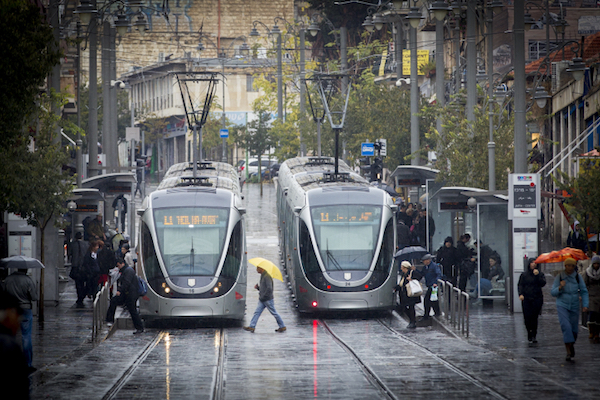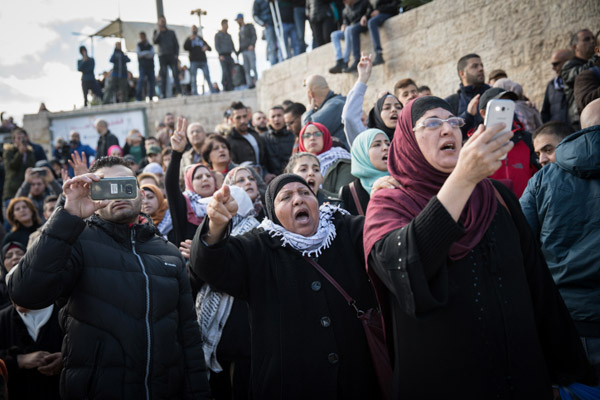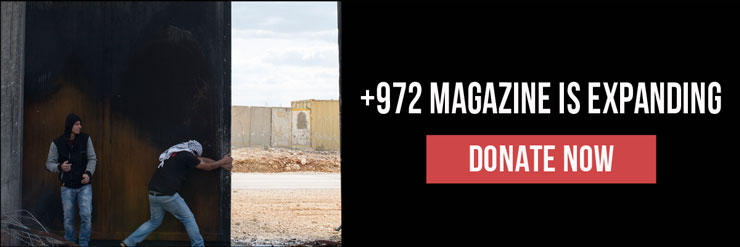Trump’s declaration will not change the fact that two nations live and will continue to live in Jerusalem, and that any solution will need to take into consideration the interests of both peoples.
By Yehudit Oppenheimer

A few hours before word got out that Trump was poised to announce he would move the American embassy to Jerusalem and recognize Jerusalem as the capital of Israel, I was on the city’s light rail train during rush hour. Crowded alongside me and the other passengers were several young Palestinians speaking among themselves rather loudly in Arabic. Their body language was relaxed and they were focused on their interactions with one another.
The other passengers were likewise absorbed in their own affairs, as relaxed as it is possible to be during the evening rush hour on the light rail. Every Jerusalemite knows that the light rail is the most sensitive seismograph of the state of affairs in Jerusalem. More than 150,000 Israelis and Palestinians use it daily with no barriers between them and relatively lax security measures. It reflects the unspoken status quo of the city’s residents that can be summarized as such: “this train must take us all safely to our destinations.” However, this delicate status quo can be shattered in a second, whenever another politician decides to try to earn political capital on the back of this battered city.
Jerusalemites, both Israelis and Palestinians, woke up the morning after Trump’s announcement and discovered that they had awoken to the same grey, conflicted, and impoverished reality that they have been trying — in spite of all the political spins — to make more tolerable for everyone living here. No golden emanation or bells of the messiah broke forth at dawn that day. Rather, the status quo will be stretched just a bit more, to the point of nearly breaking.
Yet, there is also mutual recognition — and the sober wisdom of experience — that can be summed up by an attitude of “live and let live,” which currently does not exist anywhere else in this country. This wisdom is formed of delicate balances that are embedded in the skin of Jerusalemites without them even being aware of them. These balances are what enable everyday life in the city, much more so than the military forces sent to maintain order every time another cynical politician decides to set the city on fire.
One can make vain declarations that annul the Palestinian connection to Jerusalem, but it is impossible to uproot Jerusalem from their hearts, or to uproot them from their city. Jerusalem was and will continue to be the home of two peoples. The solution will be complicated and will have to take into account the daily lives and symbolic connections of both peoples to the city, as well as the fact that both regard it as their capital. In the meantime, what makes life in Jerusalem somehow possible is this same wisdom that comes from the shared daily routine of residents from both sides, together with the hope that each side can one day it can live a recognized, sovereign life in Jerusalem. This hope, and the enduring patience required in order to maintain it, is a fundamental component of the delicate balances necessary in Jerusalem. It is this essential factor that Trump has crudely trampled on — and not just this week.
Since Trump rose to power, and even before his declaration regarding the embassy and Israeli sovereignty over Jerusalem, the Israeli side has been acting as though it has a green light from the American administration to accelerate unilateral measures in Jerusalem; to expand its borders even deeper into the West Bank; to uproot Palestinian residents from the city; to double the number of home demolitions and evictions; to increase the tension on the Temple Mount; and to push up against the wall the shared existence in this city. It does not take much imagination to understand where all this is leading us. The extremists on both sides are waiting. But one must take into consideration the Temple Mount protest this past year, which made clear that the Palestinians — as a collective — have powerful, nonviolent means at their disposal to remind the Israelis that Jerusalem does not belong solely to them.

Trump’s declaration and his conduct over the last several months disqualify him from serving as a mediator in the conflict. For years, Israeli politicians have tried to persuade American administrations that the issue of Jerusalem is so complex that discussing the issue must be postponed until the last stages of political negotiations. And now, an American president has come and interfered in the final status of the city before negotiations have even started. This after he himself admitted that it has been the Israeli prime minister — not the Palestinian president — who has adopted a non-compromising stance when it comes to ending the conflict.
Trump’s declaration can, and already has, caused great damage. But it will not change the fact that two nations live and will continue to live in Jerusalem, and that any solution, be it temporary or permanent, will need to take into consideration the interests of both peoples and their connections to the city, and will have to be agreed upon by their political leaders. In the meantime, let us all live and keep some hope alive for this city.
Yehudit Oppenheimer is the executive director of Ir Amim. This article was first published in Hebrew on Local Call. Read it here.

